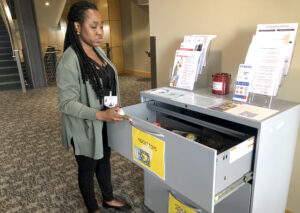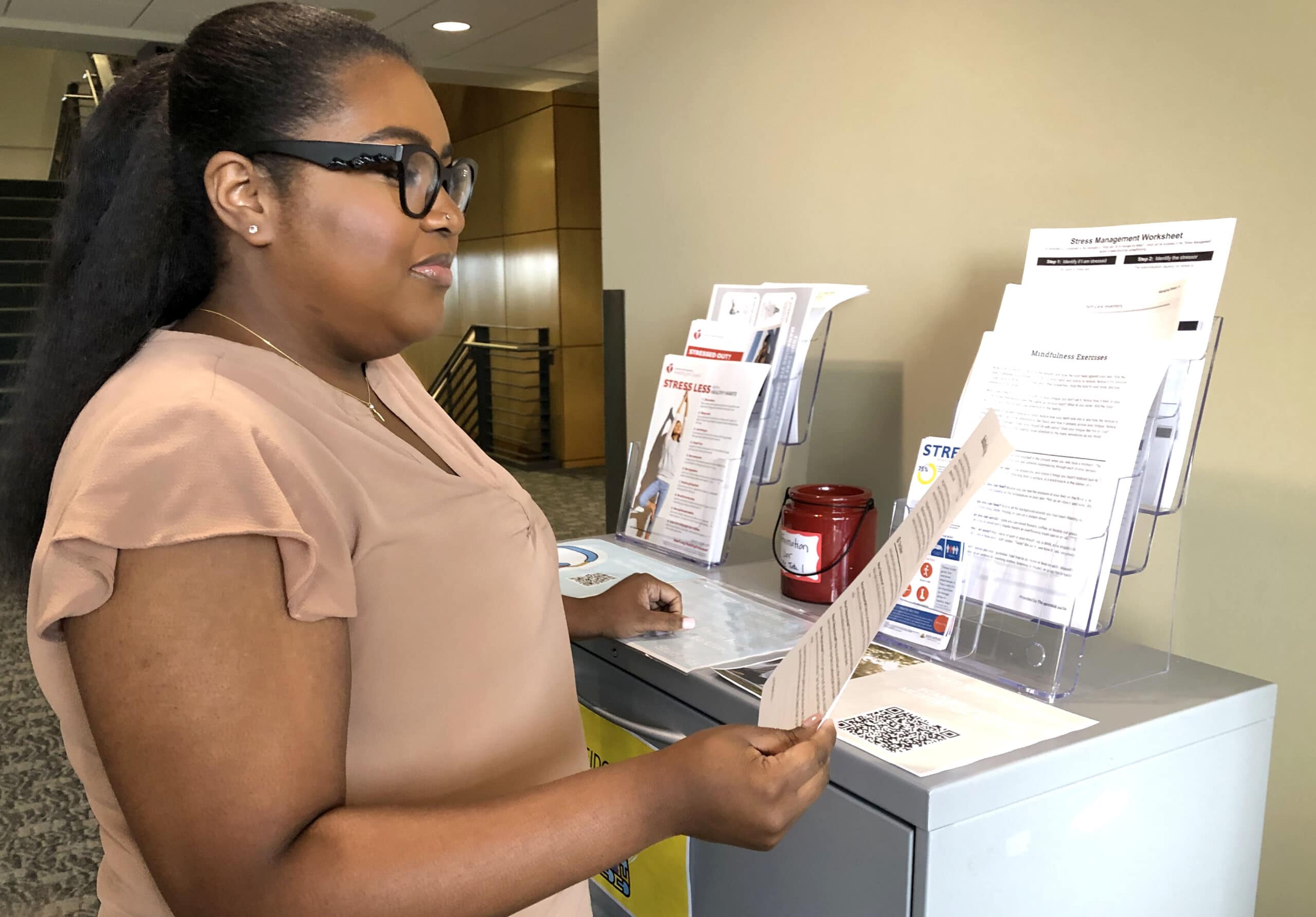College of Public Health Students Promote the Value of Coping with Stress
| Students in the University of Arkansas for Medical Sciences (UAMS) Fay W. Boozman College of Public Health converted a cabinet into a relief center for classmates burdened by stress.
Data has revealed that stress can lead to an individual developing mental and physical ailments. Tiffany Haynes, Ph.D., associate professor in the college’s Department of Health Behavior and Health Education, worked alongside her students taking a stress and health course to address stress factors within the college.
The cabinet, which was the students’ major class project, embodies the sensible solution they were looking to provide.
“Being a graduate student is stressful,” Haynes said. “The cabinet gives College of Public Health students practical information about stress management and resources to manage stress. This is a small way that we’re developing a culture in the college that prioritizes wellness.”
The cabinet, located on the third floor of the Rahn Building, offers free stress management resources that UAMS students can use. Coloring books, yoga mats, a jar of positive affirmation notes, fidget toys, stress relief pamphlets, a QR code to a Spotify playlist of relaxing music and sounds, are among the items in the cabinet.
The class also interviewed other graduate students about common sources of stress in the college. Based on info from the interviews, the class made recommendations for how the college’s faculty and staff could help students better manage stress. The students presented the information to the College of Public Health leadership team.
“The project hopefully leads to encouraging practices that can improve students’ emotional and physical well-being, which will ultimately improve health outcomes,” Haynes said. “Through spreading awareness, we can create a culture that prioritizes practices that improve our emotional wellness.”
Lachan Siebenmorgen, MPAS, assistant professor in the UAMS College of Health Professions Department of Physician Assistant Studies, is one of the students in Haynes’ stress and health course. She viewed the final project as an important service opportunity.
“The stress cabinet was a great way to give back to the student body,” she said. “As an upper-level classman, it’s my privilege and responsibility to give back to those coming behind me, just as I received help from students ahead of me. The project with its easy to access self-care items gave us a way to improve our student and academic experience.”
Siebenmorgen enjoyed the course, the concepts presented and the chance to practice what she preaches as an educator and physician assistant. She’s inspired to educate her peers, patients and students about the dangers of stress.
“We need to champion how to handle stress and incorporate stress relieving mechanisms into our lives,” she said. “When we accomplish this, we can improve our society. Self-care is a newly accepted term, and we need to continue promoting this positive culture shift.”
Tyrone Gamble appreciated the final project and the chance to gain a comprehensive understanding of stress and its harmful impact.

Ajoke Adebisi, a student in the UAMS Fay W. Boozman College of Public Health, opens the stress relief cabinet to get a stress ball.
“The course taught me a lot about some of the sources of stress,” Gamble stated. “I now know that although experiencing stress is inevitable, there are ways that we can reduce and manage stress and not become overwhelmed by it.”
“Chronic stress leads to various health conditions like cardiovascular disease, hypertension and mental health issues like anxiety and depression,” he said. “Adapting to unhealthy coping mechanisms like smoking, binge drinking or eating lots of fast foods to deal with stress can exacerbate the negative health consequences. That’s why it’s important to find positive ways to deal with stress, like exercising, practicing mindfulness and counseling services.”
Rachel Hale enjoyed learning about the various types of stress and the impact stress has on different physiological symptoms. The incorporation of the mindfulness sessions, in addition to the assignments, the vlogs and presentations made the class highly beneficial, she said.
“Sleep, diet and exercise are important aspects of stress management,” Hale stated. “Also, we should normalize conversations around mental health and share our own lived experiences to managing stress.”
“It’s crucial that people understand how to properly deal with stress as it impacts their overall well-being,” she said. “The final project was fun to work on. I appreciated how it created a tangible stress management outcome that serves the College of Public Health students.”
Ishu Karki found the class to be eye-opening as she learned about stress and why it’s important to be mindful that people perceive — and deal with — stressors differently. Creating the cabinet made for a memorable experience, she said.
“I liked doing the stress vlogs, as they helped me to reflect on my own stressors, how I was dealing with my stressors and how I applied stress management techniques to handle my stressors,” she said.
“Generally, stress is unavoidable,” Karki said. “Yet it’s important to learn healthy ways to handle stress and reduce the possible adverse health outcomes to improve productivity and the quality of life.”
The students’ enthusiasm for the course, and especially the final project, impressed Haynes. She hopes the cabinet will inspire people to practice healthy stress management.
“Through creating a stress management cabinet, we may encourage other UAMS colleges to do the same for their students,” she said. “I feel strongly about equipping individuals with the tools necessary to improve their health.
“Being able to identify and manage stress is one of the ways that we can improve the well-being of Arkansans.”
